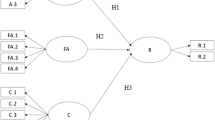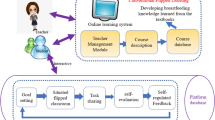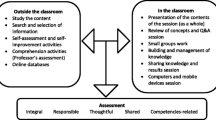Abstract
Perception is defined by Merriam-Webster dictionary as (a) the process of attaining awareness of the elements of environment through physical sensation and (b) a physical sensation interpreted in the light of experience. In common terminology, the word “perception” comes from the Latin words perceptio, percipio, and means “receiving, collecting, action of taking possession, and apprehension with the mind or senses”.
Access this chapter
Tax calculation will be finalised at checkout
Purchases are for personal use only
Similar content being viewed by others
References
Adediwura, A. A., & Tayo, B. (2007). Perception of teachers’ knowledge attitude andteaching skills as predictor of academic performance in Nigerian Secondary Schools. Educational Research and Review, 2(7), 165–171.
Allport, G. W. (1996). Pattern and growth in personality. London: WilliamClowes and Sons Ltd.
Baker, J. W. (2000). The ‘‘classroom flip’’: Using web course management tools to become a guide by the side. Paper presented at the 11th international conference on college teaching and learning, Jacksonville, FL.
Chan, L. K., Ganotice, F. (2016). The time for interprofessional team-based learning (IPTBL) in Hong Kong: A baseline study. Frontiers in Medical and Health Sciences Education (Pokfulam, Hong Kong: The Li Ka Shing Faculty of Medicine of The University of Hong Kong).
Glover, J., Ronning, R., & Bruning, R. (1990). Cognitive psychology for teachers. New York: Macmilan.
McLuckie, J., & Top**, K. J. (2004). Transferable skills for online peer learning. Assessment & Evaluation in Higher Education, 29, 563–584.
McLaughlin, K. A., Sheridan, M. A., & Lambert, H. K. (2014). Childhood adversity and neural development: deprivation and threat as distinct dimensions of early experience. Neuroscience and Biobehavioural Review, 47, 578–591. https://doi.org/10.1016/j.neubiorev.2014.10.012.
Pierce, R., & Fox, J. (2012). Vodcasts and active-learning exercises in a “flipped classroom” model of a renal pharmacotherapy module.
Ruiz-Jiménez, F. J. (2006). Aplicación de la Terapia de Aceptación y Compromiso (ACT) Para el Incremento del Rendimiento Ajedrecí-stico. Un Estudio de Caso [Application of Acceptance and Commitment Therapy (ACT) to Improve Chess-players Performance. A Case Study]. International Journal of Psychology and Psychological Therapy, 6, 77–97.
Shulman, L. (1987). Knowledge and teaching: Foundations of the new reform. Harvard Educational Review, 57(1), 1–22.
Strayer, J. (2012). How learning in an inverted classroom influences cooperation, innovation and task orientation. Learning Environments Research, 15, 171–193.
Tucker, B. (2012). The flipped classroom: Online instruction at home frees class time for learning. Education Next, 12(1), 1–2.
OED. Oxford English Dictionary: The definitive record of the English language.
Acknowledgements
The authors would like to thank the financial support from (1) the Teaching Development Grant (TDG) project (project code: 49D7) “Investigation of the impact of flipped classroom and active learning components for CARs subjects on students’ learning with reference to traditional teacher-centred approach” and (2) the small teaching fund of the project “Development of guideline booklets and case studies as e-learning tools for project-based work study (eLF14-17/ss/ABCT02)” from Learning and Teaching Committee and Department of Applied Biology and Chemical Technology, The Hong Kong Polytechnic University. The authors would also like to thank the continuous support and encouragement from our professors: Prof. W.T. Wong (Dean of FAST), Prof. S. Lo (HoD of Dept. ABCT) Prof. WY Yu (Assoc. HoD of Dept. ABCT) and Prof. Larry Chow (Dept. ABCT).
Author information
Authors and Affiliations
Corresponding author
Editor information
Editors and Affiliations
Rights and permissions
Copyright information
© 2020 Springer Nature Singapore Pte Ltd.
About this chapter
Cite this chapter
Lam, Kh., Wong, A., Siu, K.C., Zhou, L., Li, C., Wu, Jy. (2020). Students Perceived Change of Subject Learning Outcomes, Their Motivation and Experiences of Flipped Learning in Using Active Learning Strategies for Teaching and Learning. In: Hong, C., Ma, W. (eds) Applied Degree Education and the Future of Work. Lecture Notes in Educational Technology. Springer, Singapore. https://doi.org/10.1007/978-981-15-3142-2_18
Download citation
DOI: https://doi.org/10.1007/978-981-15-3142-2_18
Published:
Publisher Name: Springer, Singapore
Print ISBN: 978-981-15-3141-5
Online ISBN: 978-981-15-3142-2
eBook Packages: EducationEducation (R0)




